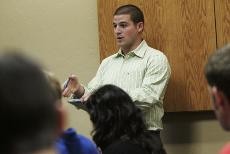The 40 percent budget cut for the Arizona university system proposed by the state legislature was again the focal point of a highly-charged ASUA Senate meeting Tuesday evening in the Student Union Memorial Center.
Associated Students of the University of Arizona President Tommy Bruce expressed fear and concern over the cuts, presenting the Senate with an idea of what the future of the UA would look like if the proposal is approved.
“”This is the largest threat we have ever seen to higher education in this state,”” Bruce said. “”(The proposal) would leave us severely mangled.””
To bring attention to students’ opposition to the budget cuts, Bruce encouraged all concerned UA students, faculty and staff to attend the Arizona Board of Regents meeting today at 1 p.m. in the Student Union’s North Ballroom.
Students attending the meeting should wear black to symbolize “”death to higher education”” that the cuts would cause, Bruce said.
“”We will not stand for dismantling our universities,”” he added.
ASUA and the Arizona Students Association are organizing several opportunities for students to speak out against the proposal that would cut the UA’s budget by $108 million by July 1. That number could reach $388 million by 2010, according to documents supplied by the Senate.
Bruce added that students have a unique opportunity to affect the outcome of the proposed cuts by speaking up to state legislators.
ASA is organizing a protest at the Arizona State Capitol on Jan. 28. ASUA will also be sending letters and petitions to the Arizona State Legislature.
The approval of the cuts would cause majors, colleges, schools and departments to be cut on every level of the university system. Other negative effects would include increased tuition, the creation and increase of new fees and massive staff layoffs, Bruce said.
Students enrolled in cut majors, departments, colleges and schools would most likely be forced to either change their major or transfer, regardless of how close they are to graduating, Bruce said.
“”This would set our university back 10, 20, 30 years,”” he said.
The UA has sustained budget cuts every year over the past 17 years, Bruce added.
Undergraduate Council calls for class changes
Students who want to add or drop classes past the first week of the semester may see fees added to their bursar’s account in future semesters.
George Gehrels, Undergraduate Council chair, shared his proposal for class changes with the Senate.
The most prominent possible changes include limiting Grade Replacement Opportunities, shortening the time span in which students can add and drop classes and enacting a fee against students for various add/drop activities.
The inefficiency of the current add/drop policies lies with the dearth of seats it creates for students trying to sign up for classes that fill up immediately. A main reason for the lack of seats is the hording of excessive units by students who intend to drop one or more classes once the semester begins, Gehrels said.
The financial penalty for dropping classes past a specific date could range from a few dollars to the $50 penalty per class that Arizona State University currently holds.
“”We’re not trying to raise money,”” Gehrels said. “”We’re trying to free up space.””
The proposal suggests a fee of $25 per dropped class past the first week.
Besides incurring fees based on add/drop activities, Gehrels also suggested restricting GROs to freshmen and sophomores, in order to free up even more space, he said.
Seniors who GRO classes rarely see a change in their grade point average, Gehrels said.
In fact, 25 percent of GRO attempts result in the same or lower grade, and restricting GROs would free up 2,100 seats, he said.
Because of the number of adds and drops past the first week of the semester, about 7,600 seats are wasted each semester, Gehrels said.
“”I think it’s a great idea,”” Sen. Bryan Baker said. “”I almost think it’s not harsh enough.””
Students do not need to hoard classes at the start of the semester to feel them out, Baker said.
Instead, students can take advantage of such web sites as “”Rate My Professor”” and online syllabi, he said.
“”Classes are so tight right now,”” Baker said. “”But the tools are available.””
Sen. Jimmy MacKenzie agreed with Baker and said that because of the current Arizona budget crisis, the UA cannot afford to go forward with the current class policies.
Not all senators were in favor of the proposed changes, though. Sen. Andre Rubio expressed concern that the seats being saved may not be worth the stress incurred by the fees against students.
Sen. Jason Mighdoll agreed, saying, “”It’s difficult enough to add classes as it is. This would make it even more difficult.””
Executive Vice President Jessica Anderson said that while there may be dissention among students over whether or not to support the proposed changes, she is confident that the results will speak for themselves.
“”There’s going to be a lot of negative reaction because it’s a fee,”” she said. “”But in the end, it will increase class availability. That’s for the students.””









